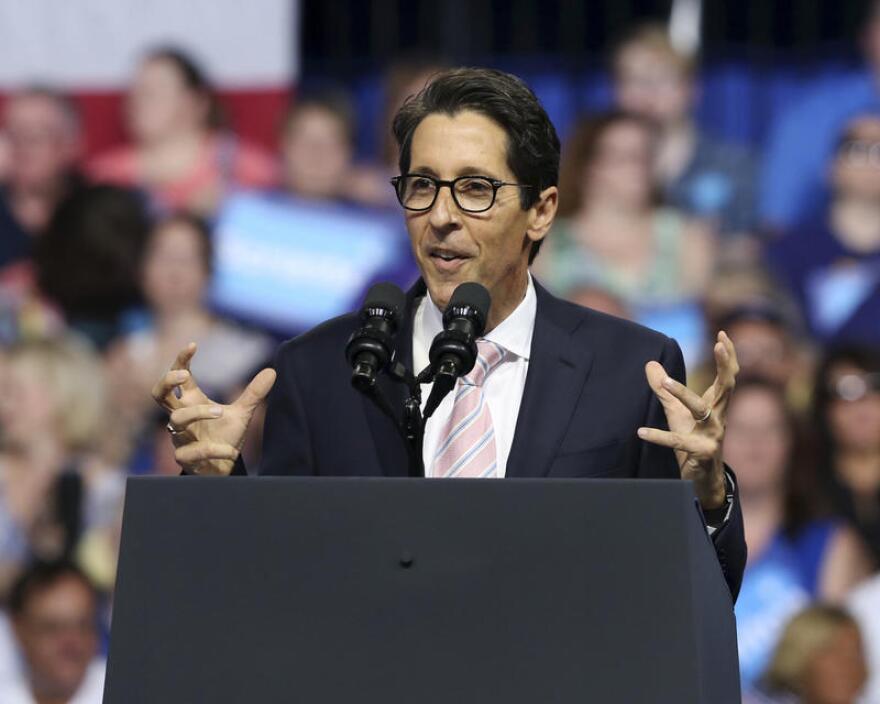Even before President Donald Trump received the drug remdesivir to help treat his case of COVID-19, Pennsylvania Treasurer Joe Torsella was raising alarms about the price of the medication.
In an August 5 tweet, the Democrat noted that remdesivir costs between $2,300 and $3,100 for the typical COVID-19 patient, or between $390 and $520 a dose, even though a single vial of the drug is estimated to cost less than $1 to produce. The tweet soon went viral, and Torsella later led 10 other state treasurers in calling on pharmaceutical company Gilead Sciences to lower the price of the drug.
In a September 16 letter to the drug maker, the treasurers wrote, “We strongly encourage you not to take financial advantage of these extraordinary circumstances, but instead rise to the occasion, in a spirit of shared sacrifice, and voluntarily and meaningfully lower the price of remdesivir immediately.”
Although Gilead representatives have since spoken with the treasurers, according to Torsella, the price of remdesivir remains the same. But last week, Torsella said he hopes the use of the antiviral drug in Trump’s treatment will prompt more people to join the treasurers’ cause.
“I hope everyone realizes that if their loved one contracts COVID-19, they would like them to be treated in the same aggressive way with every possible tool that's out there,” he said. “What they don't want to do in a moment like that is have to go through the calculation of whether they can really afford the treatment.”

Upon announcing the price of remdesivir in late June, Gilead chairman and CEO Daniel O’Day acknowledged “the significant responsibility that comes with pricing remdesivir.” While the company had “to ensure price is in no way a hindrance to ensuring rapid and broad treatment,” it also had to charge enough to finance long-term research and investments, O’Day wrote in a statement.
The CEO noted, too, that remdesivir promised to save about $12,000 in average hospital costs per patient. Research shows that hospitalized patients who take remdesivir are usually discharged four days earlier than those who received a placebo, although the treatment has not been found to reduce the risk of death from COVID-19. Those who avoid a trip to the ICU could save up to $40,000.
Torsella countered that such savings are not the right benchmark in the midst of a pandemic.
“How about using the playbook that most Americans are using, which is we are in a national crisis and people of goodwill and companies of goodwill are stepping up and saying we can afford to sacrifice a little bit?” the treasurer said. “No one's asking Gilead to lose money on the drug or not even to make money. We're asking that it be priced more reasonably.”
At current prices, Gilead is expected to make $9 billion off remdesivir during the pandemic. One analysis suggests the company could reduce the price to $390, an eighth of the current rate, and still earn hundreds of millions in profit.
Some argue that higher profits are necessary to incentivize pharmaceutical companies to invest in future medical innovations. But Torsella called Gilead’s price for remdesivir a “business misstep” that could backfire.
“I think that the furor around the pricing, given all the facts around this drug, is likely to harm their corporate reputation and harm their profitability going forward,” he said.
Torsella noted that remdesivir, originally intended as a treatment for Ebola, was developed with $70 million in taxpayer funds. And while Gilead donated 120,000 treatment courses through the end of June, the treasurers said in their letter that “donations cannot be regarded as a sufficient substitute for reasonable pricing.”
The treasurers noted that many of their states, including Pennsylvania, invest in the company. And they said they view it as their fiduciary duty, and their responsibility to taxpayers, to intervene in the pricing issue. The group consists mostly of Democrats, but two Republicans, Ohio’s Robert Sprague and Glenn Hegar of Texas, also signed on.

Torsella’s Republican opponent in this fall’s election, Stacy Garrity, also agrees the drug is too expensive. And if elected, she said she, too, would advocate for a lower price and "lead from the front and really look out for our taxpayers and Pennsylvanians."
“I think, as somebody that works in the private [sector], yes, we need to make money,” said Garrity, a vice president at the Global Tungsten & Powders Corporation, based in Bradford County. But she added, “This is a time when I would say a goal of maximizing your profits has to take a backseat, and we have to make sure that this is a drug that is available to everyone that needs it.”




